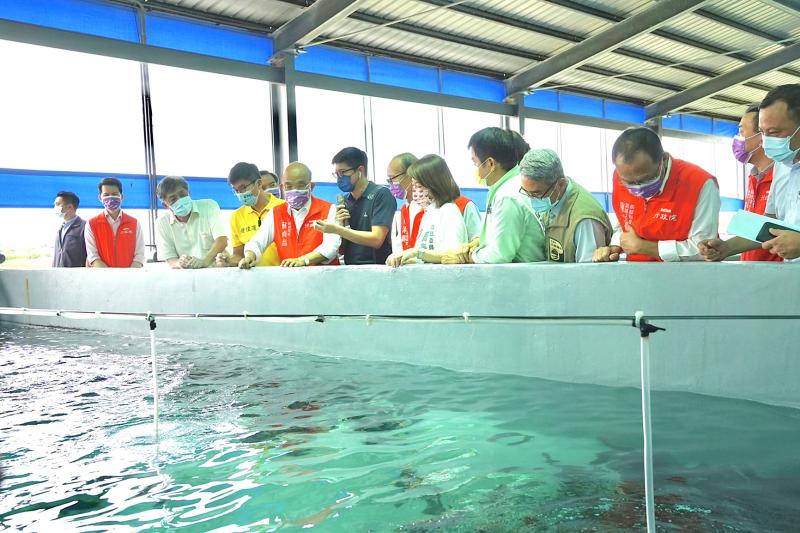A Chinese ban on grouper imports from Taiwan is both retaliation for a closer Taiwan-US relationship and an attempt to sway the elections at the end of the year, a government official familiar with cross-strait affairs said on Monday.
China on Monday banned Taiwanese grouper fish for allegedly containing banned chemicals and excessive levels of oxytetracycline.
Chinese authorities in January announced that they had found residues of illegal veterinary drugs in two batches of grouper imported from Taiwan.

Photo courtesy of the Pingtung County
The two batches were from three fish farms and were shipped to China on two vessels, Fisheries Agency Deputy Director-General Lin Kuo-ping (林國平) said yesterday, adding that the agency has launched an investigation into the farms and would soon publish the results.
Taiwan exported about 6,681 tonnes of grouper last year, generating a production value of NT$1.68 billion (US$56.6 million), Council of Agriculture data show.
Grouper exports are highly reliant on China, where 91 percent of Taiwan’s exported grouper was sold last year, accounting for 36 percent of the total yield of the year, the statistics show.
From January to last month, Taiwan exported 3,059 tonnes of the fish to China and Hong Kong.
As grouper is on the cross-strait Economic Cooperation Framework Agreement’s (ECFA) “early harvest” list, Beijing’s intent is for the “economic sanction” to serve as a threat to other products on the list, the government official said.
“This is just the beginning,” the source said, adding that China is conspiring to make the Democratic Progressive Party (DPP) suffer a bruising defeat like it did in the 2018 local elections, as Taiwanese grouper is produced mainly in Tainan, Kaohsiung and Pingtung County, which have long been strongholds of the DPP.
The official said China was likely to ban other agricultural and fishery products imports from Taiwan and “resort to every means to cause chaos in Taiwanese society.”
Beijing’s intimidation is intended to warn farmers and fishers that their profits might be taken away if they continue to support the DPP, the person said, denouncing the measure as “mean” and calling it a form of political manipulation.
The ban is another example of Chinese cognitive warfare against Taiwan, as it not only targets local fishers, but also promotes the spread of pro-Chinese Nationalist Party (KMT) propaganda online, as well as rumors about problematic products from Taiwan, the person said.
As the Chinese Communist Party’s 20th National Congress is to be held later this year, the DPP winning local elections in November would be a cause of shame for Chinese President Xi Jinping (習近平), so Beijing’s “united front” efforts this year will be “fierce and ruthless,” which the government should be prepared for, the person added.

Alain Robert, known as the "French Spider-Man," praised Alex Honnold as exceptionally well-prepared after the US climber completed a free solo ascent of Taipei 101 yesterday. Robert said Honnold's ascent of the 508m-tall skyscraper in just more than one-and-a-half hours without using safety ropes or equipment was a remarkable achievement. "This is my life," he said in an interview conducted in French, adding that he liked the feeling of being "on the edge of danger." The 63-year-old Frenchman climbed Taipei 101 using ropes in December 2004, taking about four hours to reach the top. On a one-to-10 scale of difficulty, Robert said Taipei 101

Taiwanese and US defense groups are collaborating to introduce deployable, semi-autonomous manufacturing systems for drones and components in a boost to the nation’s supply chain resilience. Taiwan’s G-Tech Optroelectronics Corp subsidiary GTOC and the US’ Aerkomm Inc on Friday announced an agreement with fellow US-based Firestorm Lab to adopt the latter’s xCell, a technology featuring 3D printers fitted in 6.1m container units. The systems enable aerial platforms and parts to be produced in high volumes from dispersed nodes capable of rapid redeployment, to minimize the risk of enemy strikes and to meet field requirements, they said. Firestorm chief technology officer Ian Muceus said

MORE FALL: An investigation into one of Xi’s key cronies, part of a broader ‘anti-corruption’ drive, indicates that he might have a deep distrust in the military, an expert said China’s latest military purge underscores systemic risks in its shift from collective leadership to sole rule under Chinese President Xi Jinping (習近平), and could disrupt its chain of command and military capabilities, a national security official said yesterday. If decisionmaking within the Chinese Communist Party has become “irrational” under one-man rule, the Taiwan Strait and the regional situation must be approached with extreme caution, given unforeseen risks, they added. The anonymous official made the remarks as China’s Central Military Commission Vice Chairman Zhang Youxia (張又俠) and Joint Staff Department Chief of Staff Liu Zhenli (劉振立) were reportedly being investigated for suspected “serious

American climber Alex Honnold is to attempt a free climb of Taipei 101 today at 9am, with traffic closures around the skyscraper. To accommodate the climb attempt and filming, the Taipei Department of Transportation said traffic controls would be enforced around the Taipei 101 area. If weather conditions delay the climb, the restrictions would be pushed back to tomorrow. Traffic controls would be in place today from 7am to 11am around the Taipei 101 area, the department said. Songzhi Road would be fully closed in both directions between Songlian Road and Xinyi Road Sec 5, it said, adding that bidirectional traffic controls would